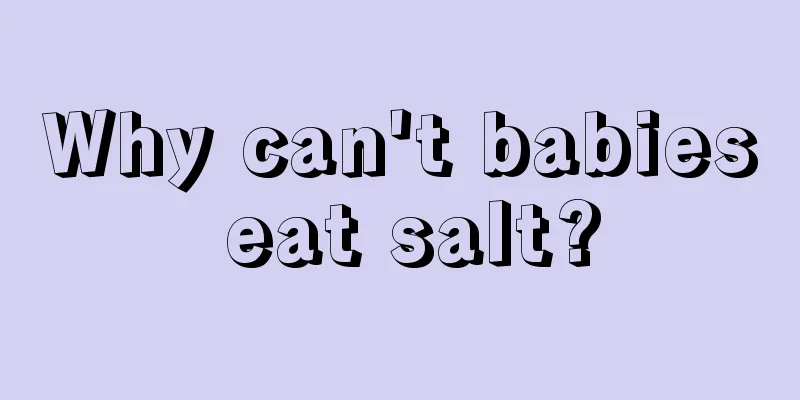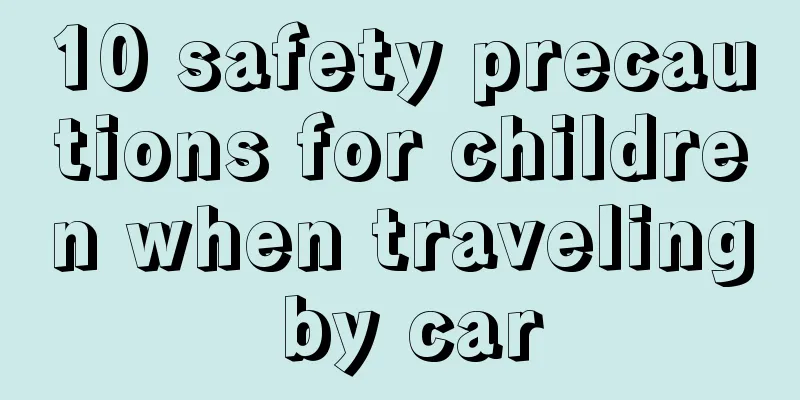What to do if your newborn loves to fart

|
Parents whose newborns fart a lot will be quite distressed, because this situation is often embarrassing for parents in public occasions. But I don’t know how to deal with it. To solve a problem properly is to understand the reasons why the baby has this condition. Let’s understand the reasons and what to do. I hope that through the editor’s introduction, it can help parents. Little hollow fart Normally, the intestinal flora has an appropriate proportion and intestinal function is normal. Occasionally, if there are too many gas-producing bacteria in the intestines or if more gas is produced during the digestion and decomposition of food in the intestines, the baby will fart from time to time. The sound of the fart may be light or loud, but the fart is not smelly. When you hear your baby farting intermittently but without any odor, it is mostly caused by increased intestinal motility due to hunger after the gastrointestinal tract is emptied. At this time, the mother should pay attention to whether the baby is hungry and feed him in time. At the same time, mothers can carefully check whether the baby's feeding method is appropriate: A. Some breastfeeding mothers think that foremilk is thin and easy to digest, so they only let their babies suck foremilk. In fact, the composition of the first half and the second half of breast milk is different. The first half of the milk contains more protein and lactose, while the second half of the milk contains more fat. If you only eat the foremilk, the protein and lactose will quickly enter the intestines through the stomach. The bacteria in the intestines will break down the incompletely digested protein and lactose and produce excessive gas. Therefore, when the baby farts too much, the breastfeeding mother should let the baby finish the milk from one breast before feeding the other. B. The baby may swallow too much air during the process of sucking milk, which is another important reason for the baby to fart a lot. If a breastfed baby does not suckle correctly when breastfeeding, and only sucks the mother's nipple instead of most of the areola, or if the feeding posture is incorrect, the baby may inhale a lot of air. If the baby is bottle-fed, if the bottle is not completely inverted and the milk does not fill the nipple, the baby will inhale air while sucking milk. In addition, if the baby cries while eating, air will enter the stomach with the milk. Let out a big fart The most abundant gas in smelly farts is nitrogen, accounting for about 80%, followed by carbon dioxide, accounting for 2% to 19%, and hydrogen, methane, oxygen, etc. These odorless gases account for 99% of the total. So, in most cases, the baby's farts are not smelly, but when the mother smells the baby's farts, she should observe whether the baby, in addition to farting smelly, also has constant burping and other signs of indigestion such as sour and smelly smell. If so, the mother should reduce the baby's food intake, especially reduce the intake of fat and high-protein foods. Mothers can carefully check whether the baby's feeding method is appropriate: A. For babies who are bottle-fed, formula milk with more protein is chosen. For example, babies aged 0 to 6 months should choose milk powder that is suitable for their age. If you choose formula milk powder for babies aged 1 to 3 years, since the protein content in milk powder at this stage is higher than that in the 0 to 6 month stage, excessive protein intake can cause indigestion and make the baby fart smelly. B. Babies who have already started eating complementary foods have ingested too much starchy food (such as rice noodles, porridge, etc.). After entering the intestines, they produce more gas during the digestion and decomposition process, resulting in more smelly farts. In addition, if you add too much meat, eggs, and beans, the protein will produce more ammonia during the digestion process, leading to constant smelly farts. Eating foods with pungent odors such as garlic, onions and leeks can also cause babies to fart smellily. Other cases: A. It may be a precursor to defecation. When the baby's formed stool is difficult to pass, the intestinal motility increases, which will expel the gas in the intestine, usually in the form of smelly farts. As the intestinal motility continues to increase and the baby passes stool, he will no longer fart smelly things. B. In addition, when the digestive tract bleeds, blood accumulates in the intestinal cavity; or when inflammation occurs in the intestine (such as bacillary dysentery, amoebic dysentery, ulcerative colitis, hemorrhagic enteritis, etc.), the gas discharged from the anus is often fishy due to bacterial decomposition. Different farts are caused by different physical conditions. The above article gives a detailed introduction on what to do if your newborn loves to fart. Therefore, if your baby shows any of the conditions explained above, appropriate treatment should be provided. Ensuring the healthy development of the child is a very important step in the child's growth. |
<<: What to do if your child sneezes
>>: How to prevent newborns from tilting their heads when sleeping
Recommend
Are giant babies less intelligent?
Basically all parents hope that their babies will...
What to do if your child has a high fever and convulsions
Because children's body resistance is relativ...
Why do children often have nosebleeds?
As we all know, nosebleeds occur at all ages and ...
What to do if a 12-year-old girl's breasts develop slowly
Some of our female friends may pay special attent...
Is it normal for a child to have a vision of 0.8?
We found that many people with vision problems ar...
First aid for children with a persistent high fever of 40 degrees
If a child's fever reaches 40 degrees, it is ...
How to treat baby's port wine stains
For babies, the appearance of port-wine stains at...
How to make banana baby food
When babies grow to a certain stage, they need to...
How far can a two-month-old baby see?
When the baby is two months old, many mothers sta...
What should be paid attention to in the diet of children with pneumonia
Young children are prone to becoming uncomfortabl...
Why does my child's hands and feet keep shaking when sleeping?
The physical condition of children is an issue th...
What should I do if my child has a dry and stuffy nose?
We have all had colds in our daily lives. In fact...
Baby feels phlegm in throat when feeding
Many mothers say that when feeding their babies, ...
Baby's head shakes while feeding
We all know that it is particularly important to ...
What causes children to often have oral ulcers?
Children often get oral ulcers because of lack of...









